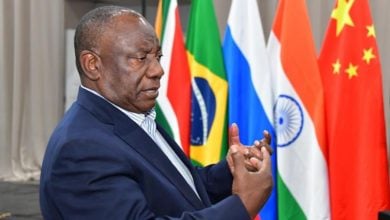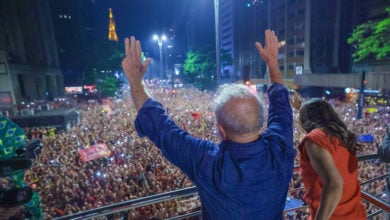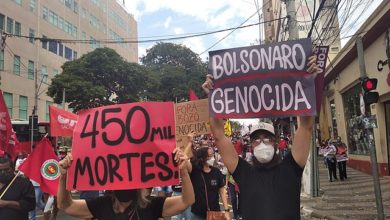Photo: Lula addressing a crowd of supporters in 2004. Credit: Ricardo Stuckert/PR
In a major victory for the Brazilian left, a panel of five justices from Brazil’s Supreme Federal Tribunal ruled 3 to 2 that former leftist Brazilian President Luiz Inácio Lula da Silva was not treated impartially. The original trial, overseen by Judge Sergio Moro during the Car Wash Operation investigations, led to Lula’s imprisonment in 2018. The decision concerns one of four of the Car Wash cases against Lula.
The court’s ruling strikes yet another blow to the reputation and credibility of Moro, who oversaw the Car Wash trials, including Lula’s. Leaked documents from The Intercept in 2019 revealed Moro’s illegal collusion with prosecutors to secure a conviction on political grounds. The ruling further underscores what has long been known — Lula’s prosecution was a politically motivated affair.
The ruling could open the door to overturning several other cases decided by Moro as part of Car Wash, and could lead to investigations of cases Moro oversaw during his career. Of note, Moro served as minister of justice and public security in the current far-right administration of President Jair Bolsonaro. At the time, Bolsonaro highlighted the critical role played by Moro in paving his way to the presidency by imprisoning Lula and disqualifying his presidential bid.
A March 8 ruling by Justice Edson Fachin had already annulled all Car Wash criminal cases against Lula on the grounds that the investigations led by Moro in Curitiba had jurisdiction only over cases related to state-owned oil company Petrobras. It thus did not extend to the cases concerning Lula. Fachin’s ruling was a legal maneuver — it conceded Lula a victory and restored his political rights. But it also sought to protect Moro by asserting that, as Moro had no jurisdiction over the cases, the matter of partiality was no longer relevant and needed no further consideration.
The Supreme Federal Tribunal’s latest decision hands Lula and the Brazilian left a much stronger victory. While Fachin had ruled on a technicality, the new decision exposes the political persecution led by Moro and Car Wash prosecutors. The recent rulings do not prevent new trials, but strengthen Lula’s series of legal victories and makes prospects of a successful re-prosecution difficult as all evidence in the case gathered under Moro’s authorization has been deemed inadmissible.
Lula, a former metalworker union leader representing the Workers’ Party (PT), served as president for two terms between 2003 and 2011. During his tenure, Brazil saw major gains in economic growth and social equality. Brazilian workers also experienced significant poverty reductions through social welfare programs like Bolsa Família and Fome Zero, launched by the PT government.
Following in Lula’s steps, Dilma Rousseff of the Workers Party won the next two elections. Desperate to return to power but unable to win an election, the right-wing opposition conspired to ensnare Lula on bogus corruption charges. Lula was convicted in July 2017 and eventually imprisoned for 580 days. As scrutiny of the credibility of Operation Car Wash and Moro increased under pressure from a determined movement in Brazil and around the world, the Supreme Federal Tribunal eventually set Lula free by ruling that he could not be imprisoned until all his legal appeals were exhausted.
The current government led by fascist Bolsonaro has catastrophically failed Brazil. Examples of its gross mismanagement and reactionary policies include the enormous wildfires in 2019 that wiped out 2.2 million acres of Amazon rainforest due to deforestation on the part of big agribusiness, vicious attacks on LGBTQ rights, a barely concealed genocidal attitude toward the country’s Indigenous population, and an abhorrent COVID-19 response with a death toll surpassing 3,000 fatalities per day.
This nightmare is a reality because of the assault on democracy waged by Moro and his co-conspirators. The latest Supreme Federal Tribunal ruling dramatically strengthens the hand of those who are fighting for a Brazil where workers and oppressed people live in dignity.





